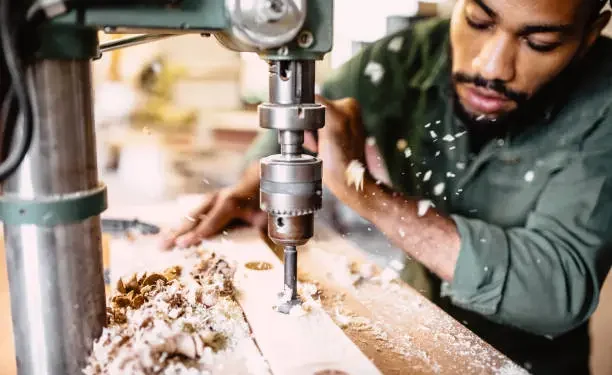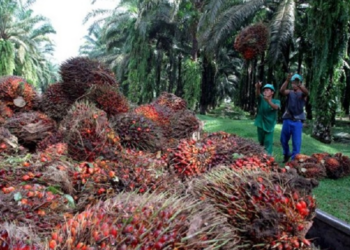In Nigeria, artisans from neighboring countries like Togo, Benin Republic, and Cameroon have long been the backbone of skilled labor.
Known for their expertise in specialized trades such as tiling, plastering, carpentry,and Plaster of Paris (POP) installation, these foreign workers have been the preferred choice for individuals and builders.
However, a significant shift is taking place.
As the economy struggles, many of these artisans are leaving, creating a growing skill gap in the sector. With fewer skilled hands on-site and project delays, concerns about workmanship have become pressing issues.
A building contractor in Lagos, Johnson Odunayo, explained the preference:
“Most foreign artisans come trained from their home countries. Their work is neater, and they take their time to get the details right. They also respect timelines better than many local artisans.”
Despite their dwindling numbers due to economic challenges, industry professionals continue to seek them out, emphasizing their precision and attention to detail.
“It’s not that there are more foreign artisans than Nigerians in the industry. The difference is that the ones who are here truly know their craft. Many Nigerian artisans lack thorough training and patience, which is why they often don’t meet expectations.” said architect Olu Adegbite.
Simon Nkemakonam, an architect, disclosed to Nairametrics that many foreign artisans in Nigeria come from other countries due to the higher value of the naira compared to their local currencies.
“A lot of foreign workers came for greener pastures. They come here, make money, and return home because the Nigerian economy was better than theirs”, he said.
However, he noted that the current economic hardship in Nigeria has made it difficult to find these skilled foreign artisans as easily as before.
“We learnt these skills in Nigeria” – Congo-born artisan
Contrary to popular belief, many foreign artisans honed their craft within Nigeria’s borders. John Mensah, a Congo tiler who has worked in Enugu for over a decade, explained that his journey began by learning from his fellow countrymen who had already established themselves in the trade.
“I learnt this work in Nigeria from my brothers who were already tilers before me. We are not better because we come from Togo. The difference is that we take our time to learn properly, while most Nigerian artisans rush the process,” he said.
- John’s perspective highlights a major issue in Nigeria’s vocational sector – the lack of structured training and patience among local artisans. While foreign workers dedicate years to perfecting their skills, many Nigerian artisans opt for quick apprenticeships, often cutting corners.
Okoro Williams, a Nigerian screeding expert, believes that the issue goes beyond skill gaps, it is also a mindset problem.
“It’s a mentality issue. Nigerians generally do not value locally made products or services, no matter how much you try to convince them,” he said.
- Williams noted that Nigeria has a good number of highly skilled artisans, but due to this perception, even when Nigerian professionals are recommended for jobs, clients still opt for foreign workers.
- Sharing his personal experience, he acknowledged the skills of some Togolese screeding artisans he has worked with and learned from. However, he pointed out that while some of them are highly skilled, others lack proper expertise yet still secure jobs simply because they are perceived as better than their Nigerian counterparts.
Speaking on payments, Nkemakonam advised that it is preferable to pay foreign artisans in instalments rather than in full upfront.
“If you pay them in full, they often take the money home to their country and leave your job unfinished, only to return weeks later. To prevent this, they are paid in bits until they complete the work.”
Immigration challenges forcing artisans into hiding
Despite their contributions to Nigeria’s construction sector, foreign artisans face significant hurdles, particularly with immigration policies. Many enter the country through ECOWAS free-movement agreements, but residency renewal fees have become a persistent challenge.
“Before, we paid N5,000 yearly for our permits, but now it has increased to N20,000. This is difficult for many of us, so some workers go into hiding to avoid the payment. I pay mine, but I know others who struggle to afford it,” John disclosed.
This increase in immigration costs has forced many skilled workers to constantly have issues with immigration picking them up even while on a sit hence affecting their work.
Personal accounts of subpar workmanship
Olalekan Ogundare, a fashion designer based in Lagos, recounted his ordeal with a local plumber after moving into a new apartment.
“I got a new toilet seat, and the plumber who installed it did a poor job. Water was dripping from the connection between the WC and the pipe. He came to fix it three consecutive times, but the problem persisted,” Ogundare lamented.
Similarly, Mrs. Oyindamola shared her experience with a technician she hired to repair her front-loading washing machine.
“They always claim to be experts in their field, yet they can’t fix something properly the first time. He worked on the machine and tested it with a quick 15-minute cycle. After he left, I noticed the machine was taking in water but couldn’t drain it after a wash. I called him back; he said he would return but never did. Someone recommended another technician who discovered it was a wrong plumbing connection. He resolved it and fixed the filters,” she recounted.
Anna Njoku recalled her experience with a DStv agent who installed a satellite dish.
“I wanted a two-way connection so my son could watch from his room too. It worked for just that day. The installer said it was a wrong wire. I spent money to get the right wire, yet the same issue persisted. He came repeatedly, trying to fix it but couldn’t. I got tired and moved on. Now, my son watches only YouTube in his room,” she explained.
Discrimination in artisan skills
Nkemakonam also highlighted the discrimination in the industry stating that while more developed countries prioritize skill acquisition over certificates, the reverse is the case in Nigeria.
“In Nigeria, lucrative jobs are given to degree holders with little or no hands-on experience, while skilled artisans are sidelined,” he said.
- He further lamented the inadequate number of technical schools in the country, despite the growing need for skilled workers.
- The architect also pointed to the increasing number of poorly built structures across the country, blaming it on the lack of practical skills among those in charge.
- Recalling an incident at a construction site, he explained that an iron bender was absent, leaving the degree-holding supervisors unable to manage the work properly.
“When the main bosses arrived, they questioned the supervisors, but they couldn’t even tell the difference between a 5mm and a 16mm rod. Yet, these supervisors are paid more than the iron benders and are assigned to oversee their work,” he said.
He noted that many artisans gain expertise through years of hands-on experience, even without formal education, emphasizing the need for a balance between technical education and practical skills in the industry.
Technical education reform
Amid these concerns, the Nigerian government has taken steps to strengthen technical education.
Minister of Education, Dr. Moruf Olatunji Alausa, recently announced the conversion of Yaba College of Technology (YABATECH) into a university as part of a broader push to prioritize Technical and Vocational Education (TVE) and Science, Technology, Engineering, Mathematics, and Medical Sciences (STEMM).
“Nigeria’s economic future depends on building a skilled workforce in these critical fields,” Alausa stated, emphasizing the need to move away from the traditional focus on white-collar jobs.
- He also proposed expanding technical courses, launching online training programs with international certifications, and promoting skills in emerging fields like AI and machine learning.
- However, the move to convert polytechnics into universities has sparked opposition from the National Association of Polytechnic Students (NAPS). The association’s president, Eshiofune Oghayan, warned that such changes could undermine the hands-on, industry-focused training that polytechnics provide.
“We reject the proposed conversion of YABATECH into a university. Polytechnic institutions play a crucial role in bridging the gap between theoretical knowledge and industrial application,” Oghayan stated.
Instead, NAPS is advocating for a structured system that strengthens polytechnic education rather than phasing it out.
Need for regulation in Nigeria’s artisan sector
In an interview with Nairametrics, Dr. Paul Alaje, an Economist, explained that one of the key issues affecting the artisan industry is the absence of a structured regulatory framework.
“The artisan industry operates without any structured oversight. If there were a regulatory system in place or even a middleman to ensure accountability, it would function more efficiently,” he said.
Dr. Paul suggested that while the government may not take direct control, state governments could collaborate with the private sector to establish a framework that ensures better organization and oversight.
He further emphasized the economic significance of the artisan sector, stating, “The artisan industry is actually larger than the entire banking sector, yet its contributions are not properly accounted for in economic indicators like GDP.”
Rise in labour cost
Dr. Paul further explained that the lack of a properly developed skillset in the artisan sector has contributed to rising labor costs.
“This gap in skilled labor makes services more expensive,” he said, citing examples of Lebanese workers who come to Nigeria and charge exorbitant fees for their expertise.
According to him, if Nigeria had a well-structured system for training and certifying artisans, it would reduce reliance on foreign labor and make skilled services more affordable.
He concluded that recognizing and integrating the sector into economic planning could bring significant benefits, including improved working conditions, better pay structures, and increased contributions to the national economy.
Prioritizing technical education, and regulating the artisan industry, could help address these challenges, ultimately driving economic growth and reducing unemployment.























